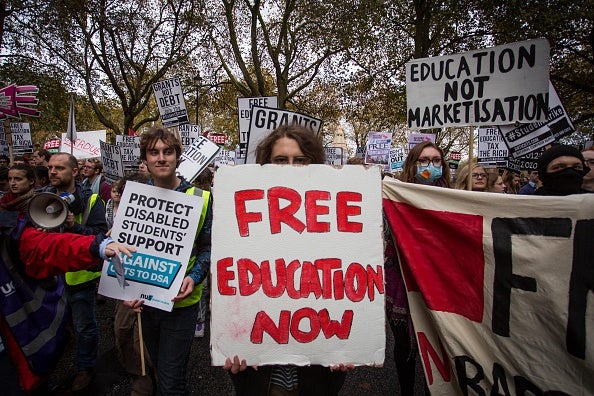Government’s higher education green paper is met with a negative response from students and student groups
Student campaigning group says, if implemented, Government's plans would 'further entrench the marketisation of universities'

Your support helps us to tell the story
From reproductive rights to climate change to Big Tech, The Independent is on the ground when the story is developing. Whether it's investigating the financials of Elon Musk's pro-Trump PAC or producing our latest documentary, 'The A Word', which shines a light on the American women fighting for reproductive rights, we know how important it is to parse out the facts from the messaging.
At such a critical moment in US history, we need reporters on the ground. Your donation allows us to keep sending journalists to speak to both sides of the story.
The Independent is trusted by Americans across the entire political spectrum. And unlike many other quality news outlets, we choose not to lock Americans out of our reporting and analysis with paywalls. We believe quality journalism should be available to everyone, paid for by those who can afford it.
Your support makes all the difference.The Government has described how it has outlined ‘ambitious proposals’ to put ‘students at the heart of higher education’ in its first major policy paper since the election - the green paper.
Highlighting reforms which, it says, are designed to boost teaching standards, support more people into university from disadvantaged backgrounds, and ensure better value for money and employment prospects for students, not everyone is sharing in the Government’s enthusiasm.
The National Campaign Against Fees and Cuts (NCAFC) - the group behind this week’s mass student demonstration in Central London - said in a statement that, if the Government’s series of changes are implemented, it would ‘further entrench the marketisation of universities’, meaning governments could raise fees without even a vote in Parliament.
“This is not just an attack on education as a public service; it is a direct assault on the right of students and the wider public to scrutinise and resist future fee rises,” the group said, further accusing Universities Minister Jo Johnson of treating students as ‘consumers’.
Read the paper in full:
The University and College Union (UCU) also said it expressed ‘concerns’ over some of the plans which have been outlined, particularly to do with a Teaching Excellence Framework (TEF). The UCU even went as far as to warn the Government to ‘step back’ from plans to allow more for-profit companies easier access to the higher education sector, particularly, it said, after ‘scandals surrounding quality of courses and the misappropriation of taxpayers’ money’.
On top of this, the National Union of Students (NUS) said that, whilst it believes all students should have access to high quality teaching, it does, however, oppose further rises in tuition fees, adding how a focus on teaching should not be linked to fees.
NUS president, Megan Dunn, described how both the NUS and students’ unions will be making sure ‘the student voice is too loud for the Government to ignore.’
So, just what is it about this green paper that has students and their advocates up in arms? Here are the key points which the Government looks set to face a potentially tough time over:
1) Higher tuition fees
Universities should be given Ofsted-style rankings and highly rated institutions should be allowed to charge higher fees in line with inflation from 2017/18. This proposal has come just days after a mass protest in London against the already rising cost of higher education in England and Wales.
Basically, under this proposal, the best performing universities will be allowed to charge more than £9,000 a year, while poorly performing ones could risk losing fee income if they are shunned by prospective students.
Unsurprisingly, this has not gone down well with the NCAFC. The group’s James Elliot warned: “It will be a disaster for students and education workers alike, meaning more fees and debt, and threatening jobs too.”
2) Creation of a new Office for Students
The proposed merger of Hefce and the Office for Fair Access (Offa) to create a new Office for Students needs to be just that: an office for students run by students and their advocates.
However, there is concern that, if this new office does come into fruition, that it may be under government influence.
Professor Dave Phoenix, chair of the university think-tank million+ and vice-chancellor of London South Bank University, said: “Any new Office for Students must be independent of government. It is also important that an independent quality assurance system is retained since this has done much to secure the reputation of UK universities overseas.”
3) Government control over student unions?
The green paper highlights how the Government is ‘currently taking steps through our trade union reforms to improve union practices and increase transparency around how funds are spent’. This, says the NCAFC, is a ‘vague threat’ of ‘increased government control of student unions’, linked to the undemocratic anti-trade union bill currently being put through Parliament. The group added: “Our right to defend ourselves collectively through our unions is likely under threat.”
4) Teaching Excellence Framework (TEF)
The TEF will measure universities’ performance on market-oriented metrics, including graduate employment, and the NCAFC has said: “This will define good teaching as little more than increasing the value of our work to employers and big business.
“Teaching will no longer be about serving students, it will be about serving our future employers.”
5) Free market?
The NCAFC has also expressed concern over the fact that new private providers ‘will be given help in the market to cut into existing public universities’, and said: “They’ll get quicker access to funding and no caps on student numbers.
“There will be lighter checks and balances on who can award degrees and call themselves a university.”
Join our commenting forum
Join thought-provoking conversations, follow other Independent readers and see their replies
Comments